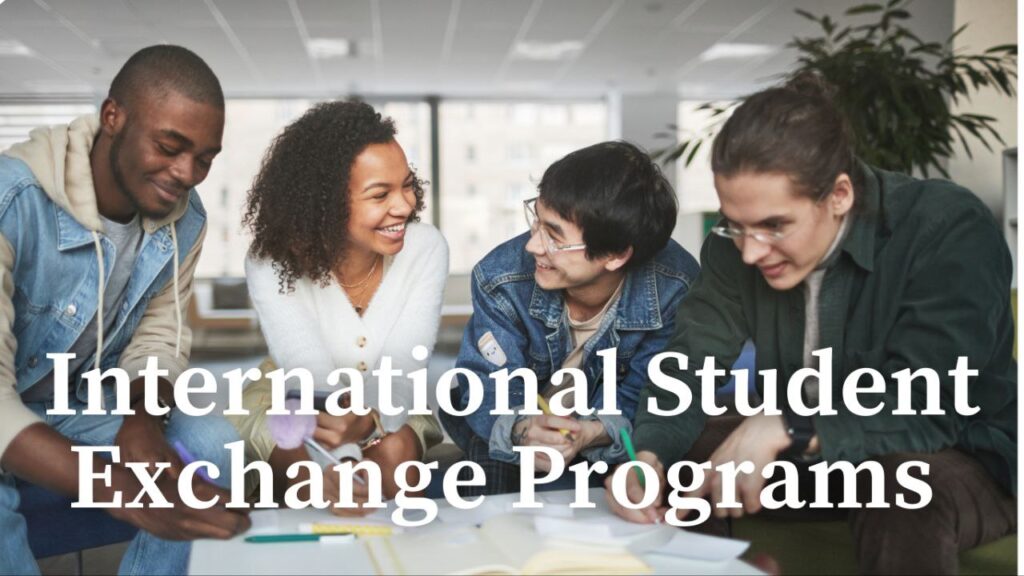
Table of Contents
Are you an adventurous student seeking to broaden your horizons, immerse yourself in new cultures, and gain a global perspective? Then you should know that an International student exchange program offers a life-changing opportunity to do just that. In this comprehensive guide, we will delve into the world of international student exchange programs, providing detailed insights, tips, and essential information to make your exchange experience truly unforgettable.
Understanding International Student Exchange Programs
International student exchange programs, often known simply as student exchanges, enable students to study abroad at a partner university or institution for a specified period. These programs foster cultural exchange, academic enrichment, personal growth, and the development of a global mindset. Whether you’re pursuing an undergraduate, graduate, or doctoral degree, there’s likely a student exchange program tailored to your academic goals.
Why Choose a Student Exchange Program?
The benefits of participating in a student exchange program are manifold:
- Cultural Immersion: Immerse yourself in a foreign culture, gaining firsthand experience that goes beyond what you’d encounter as a tourist.
- Academic Enrichment: Access diverse courses and teaching styles, potentially earning credits toward your degree.
- Language Proficiency: Enhance your language skills by living in a country where your chosen language is spoken daily.
- Personal Growth: Develop independence, adaptability, and resilience as you navigate a new environment.
- Global Networking: Build an international network of friends, mentors, and colleagues that can benefit you personally and professionally.
- Enhanced Resume: Stand out to future employers with the valuable skills and experiences gained during your exchange.
Types of Student Exchange Programs
Student exchange programs come in various forms, catering to different academic levels, interests, and goals.
- Semester/Year-Long Exchange: Spend a semester or an entire academic year studying at a partner institution. This option provides a deep immersion experience.
- Summer/Winter Programs: Short-term programs during academic breaks allow for intensive study or specialized courses.
- Research Exchanges: Ideal for graduate students and researchers, these programs facilitate collaborative research projects with international partners.
- Internship Exchanges: Combine academic study with hands-on work experience through internships at international organizations or companies.
- Language Immersion Programs: Focus exclusively on language learning, enabling you to achieve fluency in a new language.
- Faculty-Led Exchanges: Join a group of students led by professors for a structured study abroad experience.
Choosing the Right Exchange Program
Selecting the ideal exchange program requires careful consideration.
- Academic Fit: Ensure the host institution offers courses relevant to your major or academic interests.
- Location: Consider the country and city where you’d like to study. Think about your cultural preferences, climate, and proximity to travel destinations.
- Language: Assess your language proficiency and choose a program that aligns with your language goals.
- Costs and Scholarships: Explore funding options, such as scholarships and financial aid, to offset expenses.
- Duration: Decide on the duration of your exchange – whether a semester, a year, or a shorter program.
- Support Services: Investigate the support services provided by the host institution, including housing, visa assistance, and cultural integration programs.
Application and Pre-Departure Steps
Once you’ve identified your ideal program, it’s time to take the following actions:
- Research and Apply: Gather information on application deadlines, required documents, and eligibility criteria. Prepare a compelling application showcasing your motivation and qualifications.
- Financial Planning: Create a budget covering tuition, accommodation, travel, and daily expenses. Explore funding opportunities, including scholarships and grants.
- Visa and Travel Arrangements: Secure the necessary travel documents, including a student visa. Plan your travel itinerary and accommodation arrangements.
- Health and Insurance: Ensure you have comprehensive health insurance coverage during your stay abroad. Familiarize yourself with the healthcare facilities in your host country.
- Cultural Preparation: Educate yourself about the culture, customs, and social norms of your host country. Learn basic phrases in the local language.
- Academic Preparation: Communicate with your host institution regarding course registration, credit transfers, and academic expectations.
During Your Exchange
Once you embark on your exchange adventure,
- Embrace Cultural Differences: Be open to new experiences, customs, and perspectives. Engage with locals and fellow students to deepen your cultural understanding.
- Academic Success: Maintain a strong academic focus, attend classes regularly, and seek support from professors or academic advisors when needed.
- Health and Safety: Prioritize your well-being by adhering to local health guidelines and staying informed about safety measures.
- Travel and Exploration: Take advantage of weekends and breaks to explore nearby cities and attractions. Traveling is an integral part of the exchange experience.
- Stay Connected: Keep in touch with family and friends back home while nurturing relationships with your new international friends.
After Your Exchange
As your exchange program concludes:
- Reflect and Document: Take time to reflect on your experiences and document them through journals, photos, or blogs.
- Transcripts and Credits: Ensure your post institution sends your academic transcripts to your home institution. Verify the credit transfer process.
- Resume Enhancement: Highlight your exchange experience on your resume, emphasizing the skills, cultural awareness, and adaptability gained.
- Maintain International Connections: Stay connected with your international network through social media and networking events.
- Consider Further Opportunities: Explore post-graduate study or international career opportunities, leveraging your newfound skills and experiences.
Conclusion
In conclusion, participating in an international student exchange program is a transformative journey that enriches your education, broadens your horizons, and prepares you for a globalized world. By carefully selecting the right program, adequately preparing, and fully embracing your exchange experience, you can make the most of this extraordinary opportunity. Remember, your journey doesn’t end with your return home; it’s the beginning of a lifetime of global connections and opportunities.
Applicants also visit:
Apply Now for the Doha Institute for Graduate Studies Scholarship 2024 (Fully Funded)
Apply Now to the UK Clarendon Graduate Scholarships 2024 (Fully Funded) at Oxford University
The University Of Ottawa African Scholarships 2024 For African Students Studying In English






Accept my warms application for these aforementioned tips